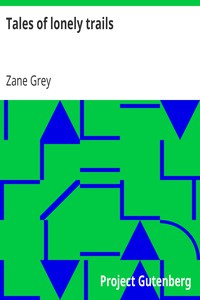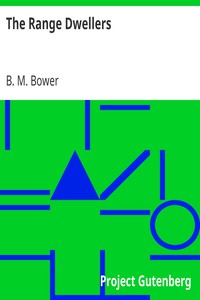Tales of lonely trails by Zane Grey (best affordable ebook reader .TXT) 📗

- Author: Zane Grey
Book online «Tales of lonely trails by Zane Grey (best affordable ebook reader .TXT) 📗». Author Zane Grey
Copple was so interesting that I must have passed the place where R.C. and I had come down into the canyon; at any rate I missed it, and we went on farther. Copple showed me old bear sign, an old wolf track, and then fresh turkey tracks. The latter reminded me that we were out hunting. I could carry a deadly rifle in my hands, yet dream dreams of flower-decked Elysian fields. We climbed a wooded bench or low step of the canyon slope, and though Copple and I were side by side I saw two turkeys before he did. They were running swiftly up hill. I took a snap shot at the lower one, but missed. My bullet struck low, upsetting him. Both of them disappeared.
Then we climbed to the top of the ridge, and in scouting around along the heavily timbered edges we came to a ravine deep enough to be classed as a canyon. Here the forest was dark and still, with sunlight showing down in rays and gleams. While hunting I always liked to sit down here and there to listen and watch. Copple liked this too. So we sat down. Opposite us the rocky edge of the other slope was about two hundred yards. We listened to jays and squirrels. I made note of the significant fact that as soon as we began to hunt Copple became silent.
Presently my roving eye caught sight of a moving object. It is movement that always attracts my eye in the woods. I saw a plump, woolly beast walk out upon the edge of the opposite slope and stand in the shade.
"Copple, is that a sheep?" I whispered, pointing. "Lion—no, big lynx," he replied. I aimed and shot just a little too swiftly. Judging by the puff of dust my bullet barely missed the big cat. He leaped fully fifteen feet. Copple fired, hitting right under his nose as he alighted. That whirled him back. He bounced like a rubber ball. My second shot went over him, and Copple's hit between his legs. Then with another prodigious bound he disappeared in a thicket. "By golly! we missed him," declared Copple. "But you must have shaved him that first time. Biggest lynx I ever saw."
We crossed the canyon and hunted for him, but without success. Then we climbed an open grassy forest slope, up to a level ridge, and crossed that to see down into a beautiful valley, with stately isolated pines, and patches of aspens, and floor of luxuriant grass. A ravine led down into this long park and the mouth of it held a thicket of small pines. Just as we got half way out I saw bobbing black objects above the high grass. I peered sharply. These objects were turkey heads. I got a shot before Copple saw them. There was a bouncing, a whirring, a thumping—and then turkeys appeared to be running every way.
Copple fired. "Turkey number one!" he called out. I missed a big gobbler on the run. Copple shot again. "Turkey number two!" he called out. I could not see what he had done, but of course I knew he had done execution. It roused my ire as well as a desperate ambition. Turkeys were running up hill everywhere. I aimed at this one, then at that. Again I fired. Another miss! How that gobbler ran! He might just as well have flown. Every turkey contrived to get a tree or bush between him and me, just at the critical instant. In despair I tried to hold on the last one, got a bead on it through my peep sight, moved it with him as we moved, and holding tight, I fired. With a great flop and scattering of bronze feathers he went down. I ran up the slope and secured him, a fine gobbler of about fifteen pounds weight.
Upon my return to Copple I found he had collected his two turkeys, both shot in the neck in the same place. He said: "If you hit them in the body you spoil them for cooking. I used to hit all mine in the head. Let me give you a hunch. Always pick out a turkey running straight away from you or straight toward you. Never crossways. You can't hit them running to the side."
Then he bluntly complimented me upon my eyesight. That at least was consolation for my poor shooting. We rested there, and after a while heard a turkey cluck. Copple had no turkey-caller, but he clucked anyhow. We heard answers. The flock evidently was trying to get together again, and some of them were approaching us. Copple continued to call. Then I appreciated how fascinating R.C. had found this calling game. Copple got answers from all around, growing closer. But presently the answers ceased. "They're on to me," he whispered and did not call again. At that moment a young gobbler ran swiftly down the slope and stopped to peer around, his long neck stretching. It was not a very long shot, and I, scorning to do less than Copple, tried to emulate him, and aimed at the neck of the gobbler. All I got, however, was a few feathers. Like a grouse he flew across the opening and was gone. We lingered there a while, hoping to see or hear more of the flock, but did neither. Copple tried to teach me how to tell the age of turkeys from their feet, a lesson I did not think I would assimilate in one hunting season. He tied their legs together and hung them over his shoulder, a net weight of about fifty pounds.
All the way up that valley we saw elk tracks, and once from over the ridge I heard a bugle. On our return toward camp we followed a rather meandering course, over ridge and down dale, and through grassy parks and stately forests, and along the slowly coloring maple-aspen thickets. Copple claimed to hear deer running, but I did not. Many tired footsteps I dragged along before we finally reached Beaver Dam Canyon. How welcome the sight of camp! R.C. had ridden miles with Edd, and had seen one deer that they said was still enjoying his freedom in the woods. Takahashi hailed sight of the turkeys with: "That fine! That fine! Nice fat ones!"
But tired as I was that night I still had enthusiasm enough to visit Haught's camp, and renew acquaintance with the hounds. Haught had not been able to secure more than two new hounds, and these named Rock and Buck were still unknown quantities.
Old Dan remembered me, and my heart warmed to the old gladiator. He was a very big, large-boned hound, gray with age and wrinkled and lame, and bleary-eyed. Dan was too old to be put on trails, or at least to be made chase bear. He loved a camp-fire, and would almost sit in the flames. This fact, and the way he would beg for a morsel to eat, had endeared him to me.
Old Tom was somewhat smaller and leaner than Dan, yet resembled him enough to deceive us at times. Tom was gray, too, and had crinkly ears, and many other honorable battle-scars. Tom was not quite so friendly as Dan; in fact he had more dignity. Still neither hound was ever demonstrative except upon sight of his master. Haught told me that if Dan and Tom saw him shoot at a deer they would chase it till they dropped; accordingly he never shot at anything except bear and lion when he had these hounds with him.
Sue was the best hound in the pack, as she still had, in spite of years of service, a good deal of speed and fight left in her. She was a slim, dark brown hound with fine and very long ears. Rock, one of the new hounds from Kentucky, was white and black, and had remarkably large, clear and beautiful eyes, almost human in expression. I could not account for the fact that I suspected Rock was a deer chaser. Buck, the other hound from Kentucky, was no longer young; he had a stump tail; his color was a little yellow with dark spots, and he had a hang-dog head and distrustful eye. I made certain that Buck had never had any friends, for he did not understand kindness. Nor had he ever had enough to eat. He stayed away from the rest of the pack and growled fiercely when a pup came near him. I tried to make friends with him, but found that I would not have an easy task.
Kaiser Bill was one of the pups, black in color, a long, lean, hungry-looking dog, and crazy. He had not grown any in a year, either in body or intelligence. I remembered how he would yelp just to hear himself and run any kind of a trail—how he would be the first to quit and come back. And if any one fired a gun near him he would run like a scared deer.
To be fair to Kaiser Bill the other pups were not much better. Trailer and Big Foot were young still, and about all they could do was to run and howl.
If, however, they got off right on a bear trail, and no other trail crossed it they would stick, and in fact lead the pack till' the bear got away. Once Big Foot came whimpering into camp with porcupine quills in his nose. Of all the whipped and funny pups!
Bobby was the dog I liked best. He was a curly black half-shepherd, small in size; and he had a sharp, intelligent face, with the brightest hazel eyes. His manner of wagging his tail seemed most comical yet convincing. Bobby wagged only the nether end and that most emphatically. He would stand up to me, holding out his forepaws, and beg. What an appealing beggar he was! Bobby's value to Haught was not inconsiderable. He was the only dog Haught ever had that would herd the pigs. On a bear hunt Bobby lost his shepherd ways and his kindly disposition, and yelped fiercely, and hung on a trail as





Comments (0)